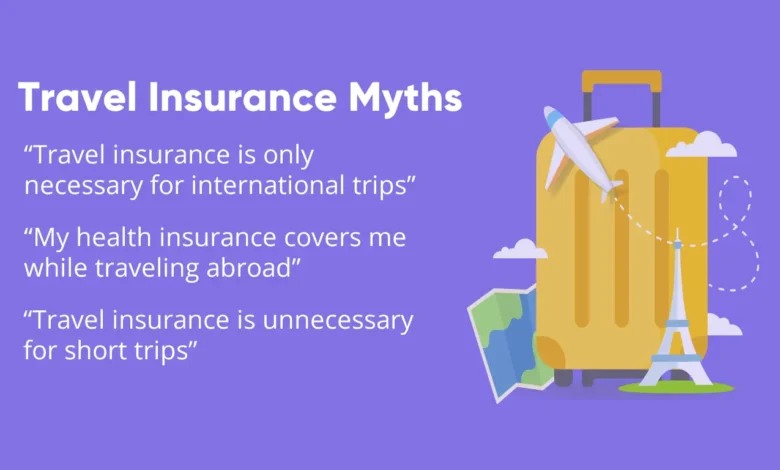Common Travel Insurance Myths: What You Need to Know

Traveling is an exciting and enriching experience, but it also comes with its fair share of risks and uncertainties. This is where travel insurance comes in – to provide financial protection and peace of mind in case of unexpected events. However, there are many misconceptions and myths surrounding travel insurance that can lead people to make uninformed decisions. In this article, we’ll debunk some of the most common travel insurance myths and provide you with the information you need to make an informed choice.
Myth #1: Travel Insurance is Only for International Trips
One of the most persistent travel insurance myths is that it’s only necessary for international trips. However, this couldn’t be further from the truth. Domestic trips can also benefit from travel insurance coverage, as unexpected events like trip cancellations, delays, lost or stolen luggage, and medical emergencies can happen anywhere.
Whether you’re taking a weekend getaway or a cross-country road trip, travel insurance can provide valuable protection. Domestic travel insurance can cover things like trip cancellation due to illness or injury, travel delays, rental car damage, and even emergency medical expenses if you’re traveling outside of your health insurance network.
Myth #2: Travel Insurance is Too Expensive
Another common myth about travel insurance is that it’s too expensive and not worth the cost. However, the truth is that travel insurance is relatively affordable, especially when compared to the potential costs of an unexpected event.
According to the U.S. Travel Insurance Association, the average cost of a travel insurance policy is between 4-8% of the total trip cost. So, for example, if your trip costs $2,000, you can expect to pay between $80 and $160 for travel insurance. When you consider the potential costs of trip cancellations, medical emergencies abroad, or lost luggage, this is a small price to pay for peace of mind.
Additionally, many travel insurance policies offer customizable coverage options, so you can choose the level of protection that fits your needs and budget.
Myth #3: My Health Insurance Will Cover Me While Traveling
Many people assume that their regular health insurance will cover them while traveling, but this is often not the case. Most domestic health insurance plans have limited or no coverage outside of their network, and may not cover medical expenses incurred abroad at all.
Travel medical insurance, on the other hand, is specifically designed to cover medical expenses incurred while traveling. This can include things like emergency medical treatment, hospitalization, evacuation, and repatriation. It’s especially important to have travel medical insurance if you’re traveling to a country with high medical costs or limited healthcare facilities.
Myth #4: I Don’t Need Insurance If I’m Healthy
Even if you’re in good health, unexpected accidents or illnesses can happen at any time. A sudden bout of food poisoning, a sprained ankle from a hiking trip, or even a severe case of the flu can all require medical attention and potentially disrupt your travel plans.
Travel insurance can provide coverage for these unexpected medical events, as well as other non-medical emergencies like trip cancellations or delays. It’s important to remember that accidents and illnesses don’t discriminate based on age or health status, so everyone can benefit from the protection of travel insurance.
Myth #5: I Can Always Cancel My Trip Last Minute
Life is unpredictable, and sometimes unexpected events can force us to cancel our travel plans at the last minute. However, many people assume that they can simply cancel their trip and get a full refund, which is often not the case.
Most airlines, hotels, and tour operators have strict cancellation policies that may result in hefty fees or even no refund at all. Travel insurance can provide trip cancellation coverage for covered reasons like illness, injury, or death of a family member, as well as other unexpected events like natural disasters or jury duty.
Some policies even offer “cancel for any reason” coverage, which allows you to cancel your trip for any reason and still receive a partial refund (usually 50-75% of the trip cost). However, this type of coverage is usually more expensive and must be purchased within a certain timeframe after booking your trip.
Myth #6: Travel Insurance Doesn’t Cover Pre-Existing Conditions
Many people with pre-existing medical conditions assume that they can’t get travel insurance coverage, or that their conditions won’t be covered. However, this is not always the case.
Some travel insurance policies offer coverage for pre-existing conditions, as long as you purchase the policy within a certain timeframe after booking your trip (usually 14-21 days). This is known as a pre-existing condition waiver, and it can provide valuable coverage for medical emergencies related to your pre-existing condition while traveling.
It’s important to disclose any pre-existing conditions when purchasing travel insurance, as failing to do so could result in your claims being denied. Additionally, some policies may have exclusions or limitations for certain pre-existing conditions, so it’s important to read the policy details carefully.
Myth #7: Adventure Sports Aren’t Covered
Many travelers assume that if they’re participating in adventure sports or activities like skiing, scuba diving, or bungee jumping, they won’t be covered by travel insurance. However, this is not necessarily true.
Some travel insurance policies offer coverage for adventure sports and activities, either as part of their standard coverage or as an optional add-on. This can provide valuable protection in case of accidents or injuries related to these activities.
It’s important to read the policy details carefully and make sure that your specific activities are covered. Some policies may have exclusions or limitations for certain high-risk activities, so it’s important to understand what is and isn’t covered.
FAQ
Q: What does travel insurance cover?
A: Travel insurance can cover a wide range of events, including trip cancellations, delays, interruptions, medical emergencies, emergency evacuations, lost or stolen luggage, and more. The specific coverage depends on the policy and provider.
Q: How much does travel insurance cost?
A: The cost of travel insurance typically ranges from 4-8% of the total trip cost, depending on factors like the length of the trip, destination, and level of coverage.
Q: When should I buy travel insurance?
A: It’s best to purchase travel insurance as soon as possible after booking your trip, ideally within 14-21 days. Some policies may have time-sensitive benefits or exclusions, so it’s important to purchase insurance early.
Q: Can I cancel my trip for any reason and still be covered by travel insurance?
A: It depends on the policy. Some policies offer “cancel for any reason” coverage, which allows you to cancel your trip for any reason and receive a partial refund (usually 50-75% of the trip cost). However, this type of coverage is usually more expensive and must be purchased within a certain timeframe after booking.
Q: Will my pre-existing medical conditions be covered by travel insurance?
A: Some travel insurance policies offer coverage for pre-existing conditions, as long as you purchase the policy within a certain timeframe after booking your trip (usually 14-21 days). This is known as a pre-existing condition waiver. However, some policies may have exclusions or limitations for certain pre-existing conditions.
Conclusion
Travel insurance can provide valuable protection and peace of mind for travelers, but it’s important to separate fact from fiction when it comes to coverage. By debunking these common travel insurance myths, we hope to provide you with the information you need to make an informed decision about your travel insurance needs.
Remember, travel insurance is not just for international trips or expensive vacations – it can provide valuable protection for all types of travel, from weekend getaways to adventure sports. And while it may seem like an unnecessary expense, the cost of travel insurance is relatively small compared to the potential costs of an unexpected event.
So before you book your next trip, take the time to research your travel insurance options and choose a policy that fits your needs and budget. With the right coverage in place, you can travel with confidence and enjoy your adventures to the fullest.



